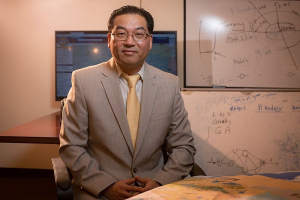Dr. Gino J. Lim, a professor and the chairman of the Industrial Engineering Department at the Cullen College of Engineering, has received two grants – one to further research into cancer treatment, and one to establish a network among three countries for digital systems requirements – worth about $56,000.
The first, “Determining lymphopenia risk factors with intensity-modulated photon and proton therapy,” is sponsored by the M.D. Anderson Cancer Center. The project period runs from September 2020 through August 2021, and the grant is for $31,084.
In a summary describing the research, Lim noted that radiation therapy is a common treatment for cancer patients. Although radiation therapy is effective against many types of localized cancers, ample evidence suggests that it can cause immunosuppression by inducing lymphocytotoxicity.
“Intensity modulated radiation therapy (IMRT) and intensity modulated proton therapy (IMPT) are often used to precisely deliver the prescribed amount of radiation to kill tumor cells and spare adjacent healthy organs,” he wrote. “Our work will help identify the best dosimetric predictors of lymphopenia and determine whether proton therapy or photon therapy would elicit better patient outcomes. The improved knowledge will lead to the development of predictive models of lymphopenia risk, which, when incorporated into treatment planning, will enable radiation oncologists to tailor dose distributions appropriately to reduce the probability of lymphopenia and potentially improve survival.”
Lim said this grant is the continuation of a long-term research collaboration between his team at UH and M.D. Anderson.
“This is an ongoing collaborative research effort between the two institutions,” he said. “My research team at UH has been working with my collaborators at MDACC to develop mathematical models and computational algorithms for the past decade.”
The other grant, “Digital System Requirements for Natural Resources Engineering,” is meant to establish an interdisciplinary network of academic and industrialists in Norway, Brazil and the United States. The effort will stretch from October 2020 through September 2023, and it is sponsored by the University of Oslo in Norway.
“DSYNE is a project to build an international research, education and innovation network in digital requirements management in engineering,” Lim wrote. “This process is a vital, but very expensive part of the capital projects that are used to build today's oil platforms, energy plants, infrastructure and processing facilities.”
As part of this networking, there will be three, week-long workshops with tutorials, held in conjunction with major industry conferences, as well as the development of a course to be taught at the partner universities and offered as continuing education courses. There will also be short and long-term exchanges of staff, students and interns between the participating organizations.
“One of my students connected me to this group of researchers at the University of Oslo because of my interest in Systems Engineering, applied to Oil and Gas,” Lim said. “Due to COVID-19, we have our first virtual workshop scheduled for next month.”
